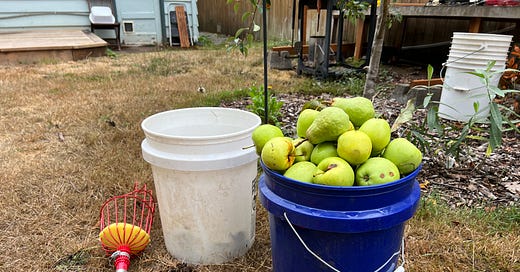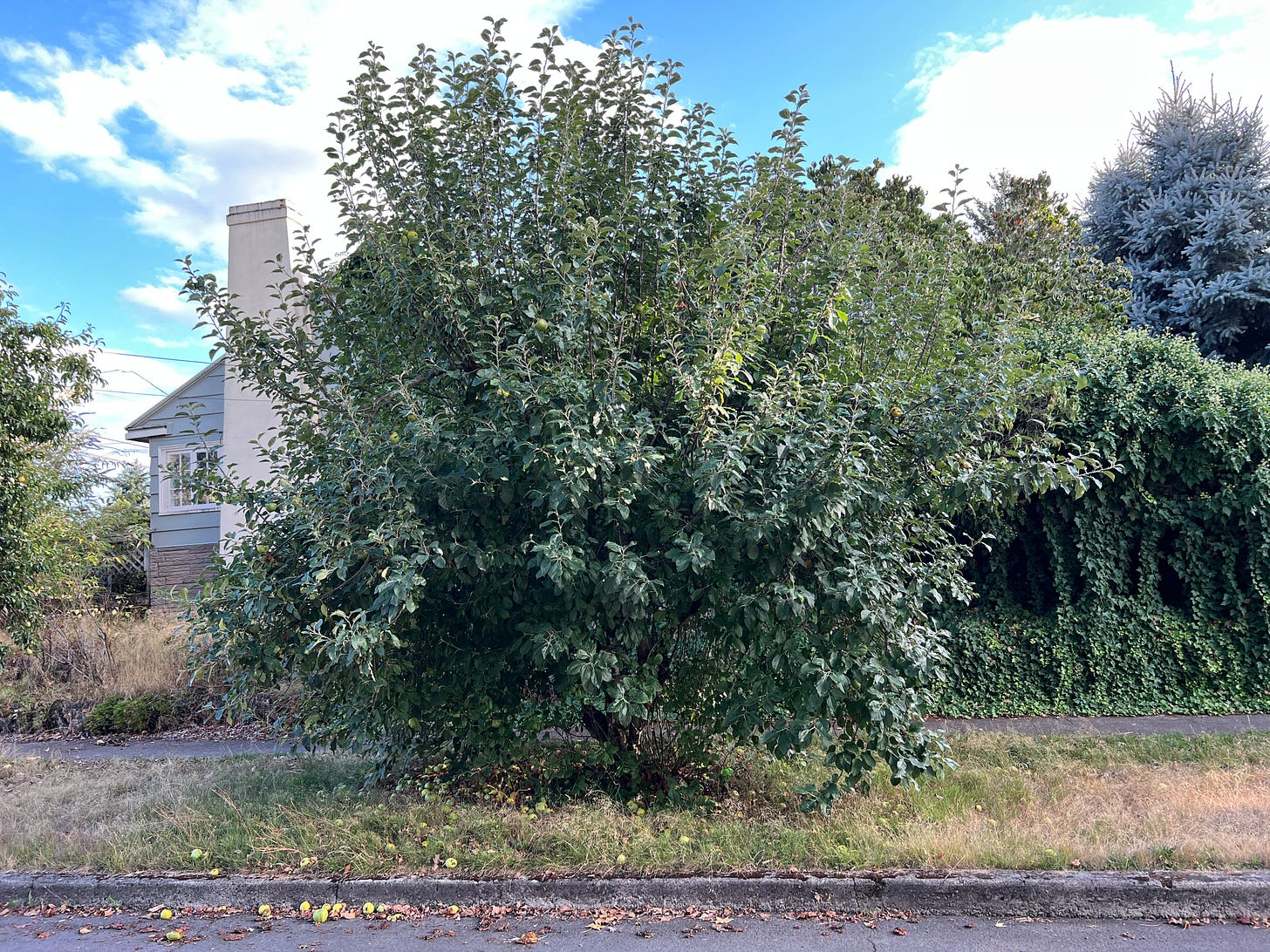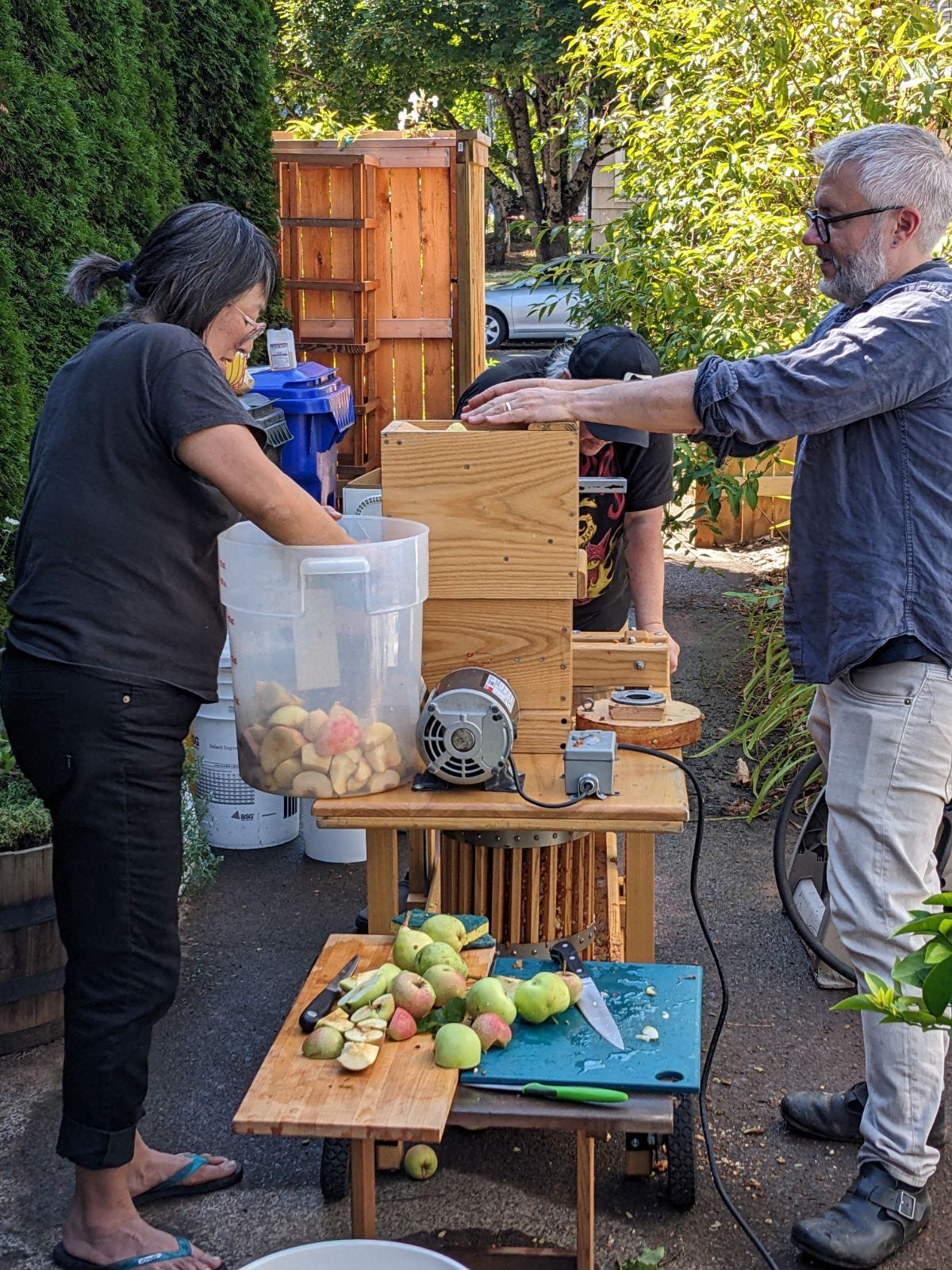The apples have been rotting on the ground for months.
They began falling off at the peak of August's heat, rings of brown-splotched, lumpen fruit coalescing around the trees. Walking around the neighborhood, we could smell the neglected apple trees from a hundred paces, the smell Doppler shifting as we neared, lilting sweetness giving way to sour decay.
It was like passing graveyard after graveyard of good intensions, all those visions of pies and sauces that drove humans to bring an apple tree home from the nursery. Maybe the tree's first humans died, or perhaps they moved across town. The more the tree grew, the less its tenders knew what to do with it.
A few human generations later, apple trees tower over our sidewalks and lawns, bombing us with moth-infested fruits every fall. One of my neighbors just hired arborists to remove an old apple tree looming over her house, and they sawed into a hollow center. The tree had become a moss-covered, fruitless death trap.
"Imagine the quality of life of a feral chicken or a feral cow," writes orchardist Ann Ralph, author of Grow a Little Fruit Tree. "A fruit tree is a domestic creature much like they are. Fruiting aside, if fruit trees are to be adequate even as trees, they need human interaction. A feral fruit tree is useless even to itself."
This is my fourth fall in Portland, and every year I have nurtured my own good intention to gather as many of these neighborhood apples as I could and press some Arbor Lodge cider. Good organizations like the Portland Fruit Tree Project already divert tons of unwanted apples to people who can't afford to buy them. But the excess is so excessive. And I am so greedy.
This September, I finally called up FH Steinbart, reserved an electrical grinder-press for a Saturday afternoon, and put up posts on three neighborhood Facebook groups asking for unwanted apples. My friend Robin, a longtime homebrewer, agreed to help me press and ferment the juice. And the offers rolled in.
Several neighbors invited me to pick apples from their backyard trees, chatting as we filled a bucket or box. Some friends in Southeast (yes, that's cheating) passed along a bag of fruits from their espaliered tree. One poster invited me to pick apples from the trees next to a community garden, reassuring me that they were public property; when I returned home from gathering a small bagful, I found another post telling me I’d be stealing from the neighborhood. My best source came from neighbors who implored me to glean from two tall trees living in the parking strip next to a cannabis grow house they swore no one lived in.
After hauling home 70 pounds of fruit, my car smelled amazing. My back patio, covered in boxes of fruit, smelled amazing. Ripening apples always smell clean -- not a scouring, chemical clean, but as if an alpine wind had just blasted through the space.
On cider-pressing day, Robin and I fetched the cider press and set it up in my driveway, and our friend Koto joined in. She showed up with a fourth worker and 30 pounds of apples from her own trees. By the end of two hours, the compost bin was heavy with apple pulp and bug-riddled discards. The hornets swarmed around our station. Every stretch of exposed skin was sticky with juice. And we had 10 gallons of apple-pear cider to divvy up.
Koto took home three gallons. I stuck a one-gallon jug in the back of the fridge and poured the rest into a six-gallon fermenter, which I heaved into the basement. I dosed it with Campden tablets and, 24 hours later, a packet of yeast. Within 24 hours, the airlock bubbled away.
Then life intervened. I traveled for a week. Robin traveled for a week. I got busy. Robin got busy. We reconvened, I confess, a month later for bottling. We pried open the lid — and it was as if someone had lobbed a sulfur bomb into the kitchen. While I tipped the cider down the toilet and my husband opened all the windows, Robin returned home to do some research. She quickly identified the flaw. "It's called rhino farts among the home brewers," she texted.
How had this happened after all those times I easily made one-gallon batches with unpasteurized cider from the farmers' market? I asked a winemaker friend — Christian, of Caelestis Cellars in Southwest Portland — what might have caused the rhino farts. Maybe the fermentation stopped early on, he suggested, and while you let the fermenter sit, other bacteria or fungus invaded. Basically, I concluded, if I wanted to ferment five gallons of fruit juice, I had to approach cider-making with more attention to detail, monitoring the fermentation to catch problems before they turned into the kinds of disasters that would make our house uninhabitable for six hours.
To call my disappointment grief would be a touch too melodramatic, but it did keep me from writing for weeks. I had wanted to drop bottles of hard cider off at the tree owners' houses. Or throw a cider party. Or do something meaningful with six gallons of Arbor Lodge hard cider. Seventy pounds of apples was a massive gift to just ... waste.
Beyond discovering the limits of my dilettantish projects, the cider failure also made me realize how much I’ve been spurred on by a belief in the transformational power of beauty: that making delicious things from the fruits, herbs, and fungi I gathered from the streets around me was a way of encoding my kinships with this landscape I now inhabit. Of writing it into my body, and then documenting it in words.
If you live in Portland, and you want to drink backyard-tree apple cider, the Portland Cider Company is currently pouring its annual Community Cider, which it makes from tens of thousands of pounds of fruit that people donate. The proceeds go to organizations fighting childhood hunger. It's a hell of a good cause.
Less of a good cause, more of a plea for redemption: Two weeks ago, I pulled the jug of fresh cider from my fridge and discovered it was still drinkable. I purchased a gallon from Draper Girls' stand at the PSU Market, combined the two, and added yeast. The airlock on the fermenter stopped bubbling a few days back. I should really open the lid to check on the contents. I keep putting it off.









Don't put it off!!! Ha! ;) Thanks for the plug for our little winery. XO Christian has had plenty of terrible wine in his past...it is the way you learn to make good wine. I bet the same goes for cider.
Loved this, especially the ending! Ha! I could smell the smells wafting through your words. Next year we'll be sure to give you our NoPo apples.